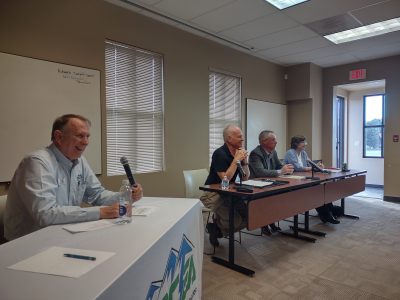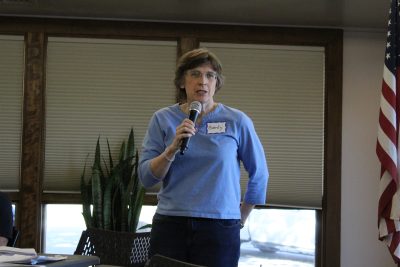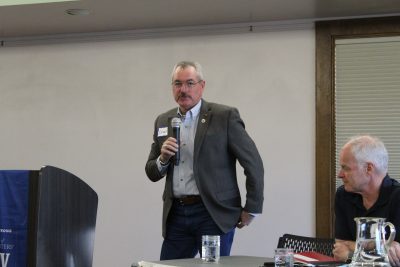
SDCEA candidates answer questions at the League of Women Voters of Chaffee County candidate forum on Tuesday, April 30. From left to right: Charlie Abel, Ed Simmons, and Sandy Long. Photo by Carly Winchell.
The final candidate forum hosted by Sangre de Cristo Electric Association (SDCEA) for their current Board of Directors election was held on Thursday, May 16 in Buena Vista. All three candidates were in attendance.

Candidates answer questions from SDCEA CEO Gary Kelly before a public meet and greet at the final SDCEA Candidate Forum. From left to right: Gary Kelly, Ed Simmons, Charlie Abel, and Sandy Long. Photo by Carly Winchell.
Ballots have already been sent out for this election and online voting is live. There is a limit of one vote per member address. According to the SDCEA website, only 22 percent of eligible voters participated in the previous election.
The SDCEA election is scheduled to conclude on Monday, June 3.
The voting cutoff will be 1:00 p.m. to receive ballots or vote online. SDCEA is inviting members to cast their vote in the election to help guide future decision-making and the direction of the electric cooperative.
Two seats will be decided in this election. One is a contested at-large seat and the other is an unopposed rural Chaffee/Lake County representative seat.
Candidates Sandy Long and Ed Simmons are competing for the open at-large seat. Charlie Abel is running as the incumbent for the uncontested Chaffee/Lake County seat. Despite having no competition for his seat, Abel has attended various forums to answer questions from the public.
SDCEA Interim CEO Gary Kelly Poses Questions to Candidates
During the Sangre forum in Buena Vista, the candidates answered questions in a nearly at-capacity SDCEA Community Room. All three were allowed opening and closing statements between which Kelly posed four questions for them to answer. The forum concluded with a meet and greet where attendees could speak with candidates and ask questions directly.
Opening Statements
Abel has lived in Chaffee County for more than fifty years. He went through kindergarten through twelfth grade here and is a CPA by trade with his own practice based in Buena Vista.
Abel was elected to the SDCEA Board in June 2015 and was appointed treasurer shortly thereafter. He has since served as secretary and is currently vice-chair of the SDCEA Board.
Abel was elected to serve on the Tri-State Generation and Transmission Board in April 2019 and currently serves on the Executive, the Finance and Audit, and the Board Policy Review Committees. where he represents over 500,000 members. Abel was elected to the board of directors of the National Rural Utilities Cooperative Finance Corporation (CFC) in September 2021. The CFC is a national cooperative formed to provide financial services and capital to cooperatives across the country.
“I appreciate the opportunity to work for you and do the best that we can to keep reliable, affordable, and safe,” commented Abel.
Long grew up in Colorado and lived in Dallas. She earned a degree in electrical engineering and a Master’s in Business Administration (MBA). She worked in product management, which she described as the point where technology and business mix. Most of her career was in telecom, but Long did work as a product manager for a solar inverter company for four years.
Long served on the Board of Harper Brush Works (a push broom business started by her great grandfather) for eight years, has been an SDCEA member for 20 years, and has been attending SDCEA Board meetings for the past two years. Long has worked in climate advocacy with Ark Valley Energy Future and the Chaffee County Citizens Climate Lobby.
Long said she has also kept up with Tri-State lawsuits and their new commitments to reducing carbon emissions.
“I look forward to working on these opportunities in a more formal capacity,” said Long.
Simmons lives north of Buena Vista. He began a career in the U.S. Navy out of high school, eventually leaving active duty and entering the Naval Reserve Force. In November 2001 he received a commission in the Navy’s Civil Engineer Corps and he honorably served in three combat zones. Simmons retired from service after forty years in October 2023. During his career, he commanded more than two hundred people and worked for fleet admirals. His last command was the Pacific Command.
Simmons graduated from the Naval Nuclear Power Program and was assigned as a reactor operator on several submarines. He has a degree in mechanical engineering from the University of Colorado. After graduating with his degree, Simmons worked to design power plants.
“I have designed numerous base-loaded power plants using various fuel sources and peaking diesel engine power plants. I have designed modifications to support the continued operation of several nuclear power plants and consulted during the design and operation of a geothermal power plant,” stated Simmons.
In your opinion, what are the most important challenges and opportunities facing our organization?
Long began by mentioning the outages over the previous weekend before emphasizing safety, reliability, and responsiveness. She then turned to what has been one of her main talking points throughout the election; high rates and the address of “peak demand” to lower them.
“We’ve already got one of the highest electricity rates in Colorado,” said Long, citing the high monthly access charge. “I’d like to see that access charge remain low or get lower actually, so people can actually control the amount of their bill by controlling how much electricity they use.”
Long said that Tri-State charges SDCEA for peak demand usage, which is essentially the highest amount of electricity used in a day, which happens typically around six or seven in the evening. “If we can reduce that peak demand. . . we don’t have to pay Tri-State as much.” To do this, Long suggested getting storage for some of the solar arrays, and the creation of time and use plans.
Long also clarified that she does not support leaving Tri-State, who is SDCEA’s electricity producer/supplier.
Simmons identified the need to move away from fossil fuels. 43 percent of power comes from coal-powered plants from the power provided, so that will need to be changed over the next six to eight years.
Simmons explained as those assets go offline, other assets will need to come online to maintain the power supply. He cited various assets of Tri-State, such as geothermal, hydroelectric, and natural gas.
“Maintaining the right spread of power from all those assets combined is how we maintain our reliability,” said Simmons.
He emphasized the need to stay on top of changes coming down the line to be adaptive. He also made a point to mention SDCEA as a resource for homeowners in the area, who can call in for advice on changing or modifying their homes.
Abel cited three things as the responsibility of a local cooperative: educating the consumer and the public through improved communication, controlling costs through rate designs that allow for flexibility, and appropriately valuing Variable Energy Resources (VERs) to keep the cooperative financially healthy.
“I do not believe costs are going to go down,” said Abel. “Inflation is here to stay.” The challenge is to keep rates as reasonable as possible.
If elected, what do you see as your job as a board member?
Abel replied, “My job as a board member is to take this seriously. This is not a hobby to me.”
“It takes commitment. It takes an understanding that board work is hard work. And we’re not going to make all the right decisions, but we have a duty to gain as much knowledge as possible and listen to make, hopefully, fewer poor decisions.”

Sandy Long is a candidate for the at-large seat on the Sangre de Cristo Electric Association’s Board of Directors. Photo by Carly Winchell.
Long reflected on her experience on the Board of Harper Brushworks. “Your first responsibility as a Board member is that you are entrusted by your shareholders, in this case by the members, to oversee the business.”
Secondly, Long said the Board has to make sure there was a solid and trustworthy CEO and management team, which they would train and coach.
She also highlighted a need for at least some technical industry knowledge and the ability to focus on mid and long-term goals through a strategic plan.
Simmons replied that, over the next five to seven years at least, one of the more vital aspects would be understanding the transition from one energy source to another. Part of this is understanding the energy supplier and what they are doing to generate more energy, and what is coming online.
“It’s not an exact science, not inexpensive. . . They’re [power plants] hundreds of millions of dollars.”
Staying educated and up to date on the latest technology was also high on Simmons’ list. “The higher educated the member is, the better the board knowledge is,” said Simmons.
Describe your view of the future of energy. What is SDCEA’s role in that future? Are you concerned about future energy issues?
Simmons said that he always dreamt that fusion power would be developed and come of age. He admitted a fondness for nuclear power and hydrogen-powered cars, and said that he would love to see a 100-megawatt power storage device.
On the topic of concerns, Simmons turned to Ark Valley Energy Future (AVEF) (of which candidate Long is a member). Simmons said that AVEF’s mission statement talks about local renewable energy to achieve an economically and environmentally sustainable energy future.
“The questions I would ask are, ‘What’s your plan? What’s it going to cost?’ and ‘How much money will it save me as a consumer?'” Simmons seemed skeptical of the mission without a clear plan to achieve it and expressed concern over whether the pursuit of this mission would pressure or mandate homeowners like him to install expensive solar equipment.
Long followed up Simmons’ critique by immediately stating she would resign as a board member from AVEF if elected to the SDCEA board, and stated that the roles of a board member of each organization is different.
As far as plans go for lowering energy costs, Long returned to her point about lowering peak demand to lower rates.
“I am excited about the future of energy,” added Long who cited Colorado requirements to reduce greenhouse gases, money from the federal government, increased use of electric vehicles and heat pumps, advancing technology and more.
“We need to be able to proactively manage that new growth,” said Long.

Charlie Abel is an unopposed incumbent for the Lake/Chaffee seat on the Sangre de Cristo Electric Association’s Board of Directors. Photo by Carly Winchell
Abel replied that, yes, he is worried about the future.
“I believe that this transition, which I would characterize as an energy addition, has been mismatched,” said Abel. “We’ve got a collision of policy, resource management, finances, and physics that is creating incredible challenges for us as a nation to keep power going.”
Despite these concerns, Abel asserted that he believed they would be able to get there, but it would not be fast, cheap, or easy.
In the end, Abel said there would be an energy future that is a mix of every possible resource. To reach that equilibrium, Abel said they would need to push as hard as they can while still being careful not to break anything.
What do you think members want most from their electric cooperative?
Long joked, “You want cold beers and warm showers.” She said people want reliability and affordability and to maximize the use of clean energy without compromising the other two.
She said that people don’t want to think about the cooperative too much, to trust the board, and for the cooperative to be a resource. She also said they need more communication and transparency with members.
Simmons cited some things he had heard from members while running in this election:
“I don’t need a lot of it, but I need reliable power for my home and small business.”
“I don’t want solar panels and electric vehicles jammed down my throat.”
“I want to understand my bill.”
After listening to people, Simmons summed up their wants in four points: confidence that SDCEA can provide power; confidence that the organization is financially stable; confidence that SDCEA is working in the members’ best interest; and managing growth.
Abel replied, “What consumers want most is safe, reliable electrical power at a reasonable cost.”
He clarified that safety involves many things, such as safety in the shop and the field, cybersecurity, physical security, and the vegetation management plan.
“We do our best to keep the bill as low as possible, but we’re not going to be the lowest in the state. We’re never going to. And, again, reliability comes at a cost.”
Closing Statements
Abel closed simply. “I strive to be a servant leader and strive to listen and gain as much knowledge as I can about the industry. It’s a fascinating business, and I enjoy my time being, hopefully, a good steward of the financial aspect and being a policymaker. I don’t get down in the weeds, but this is a critical business to our community, and I appreciate the opportunity to serve you.”
Long first thanked SDCEA and its staff, her supporters, and some in the community who have endorsed her before clarifying a few things.
“I am not in favor of leaving Tri-State,” said Long. “Don’t worry about brownouts if I get elected.”
On the topic of the “not-yet proposed” geothermal plant in the area, she explained that she’s been listening to all parties but, as a board member, would not have any dealings with that plant since SDCEA gets its energy from Tri-State.
“I support projects that are profitable therefore I support renewable energy projects that will lower our costs and make our grid more resilient,” concluded Long.
Simmons closed out the formal portion of the forum by addressing the fact that he doesn’t have any formal board experience, pointing out that only one person at the table (Abel) had experience on the SDCEA board.
“If you only elect people with experience, there would be no board,” said Simmons.
He said that he was not the most eloquent speaker and said he had no hidden agenda or reason for running.
“This is an unpaid position. . .” adding that his commitment can be summed as “It’s for the love of the industry.”






Recent Comments